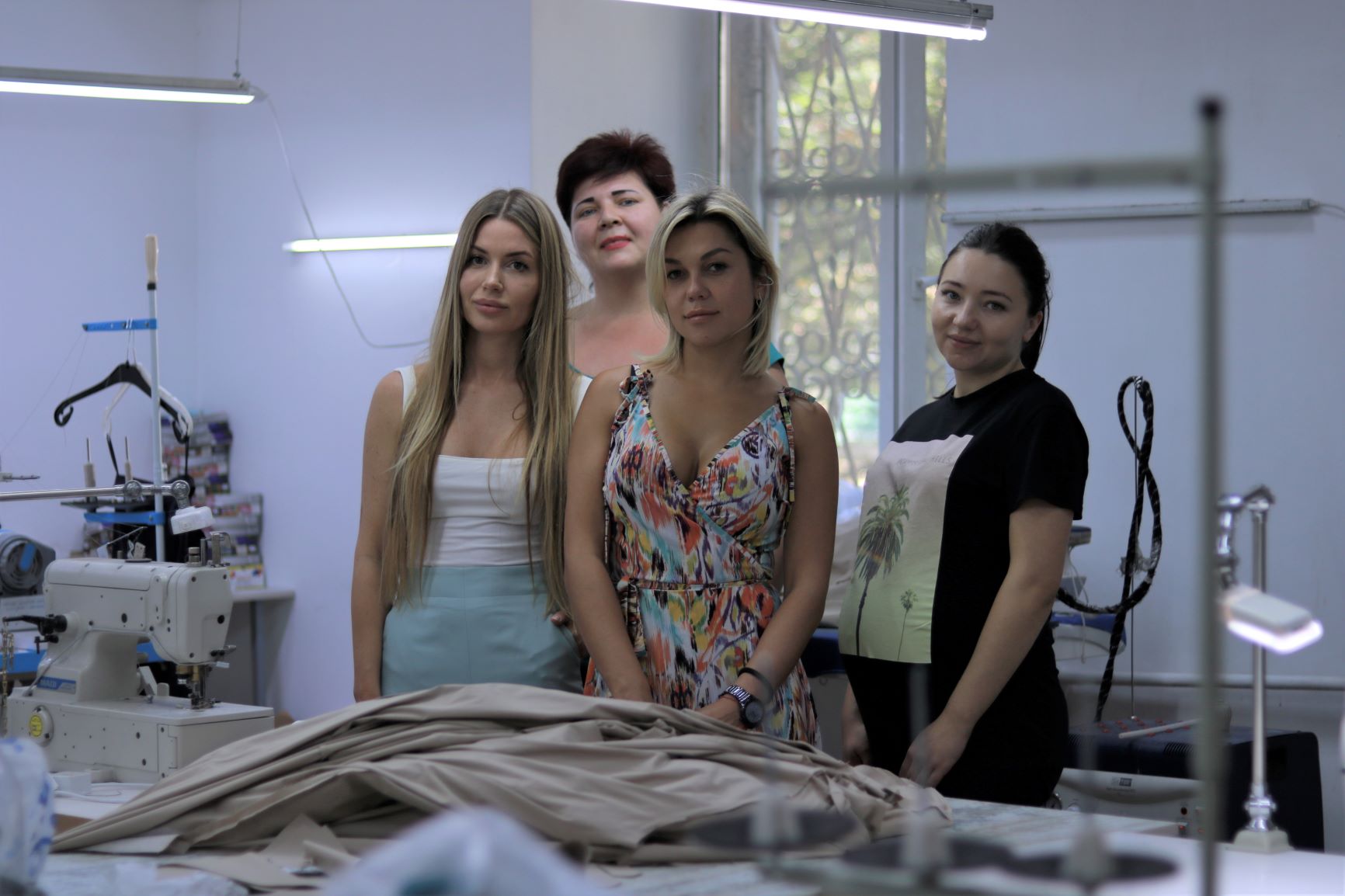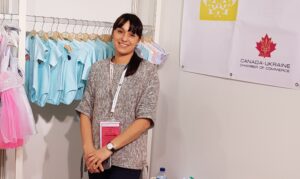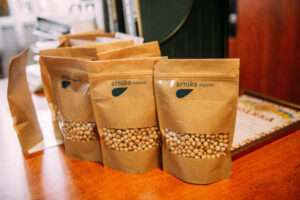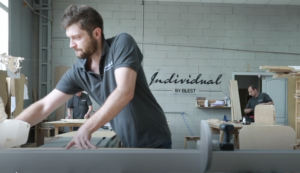
Iuliia Khorishko and Iuliia Hurova, founders of SOHO Chic, a Dnipro-based company, know each other from childhood. In 2011, the young women decided to try their hands at business. It all started with a small shoe shop, where they sold foreign-made footwear imported from the USA, Turkey, and China. Simultaneously, they started adding clothing items to the shop’s offerings, which subsequently became their specialty.
“We always loved to sew interesting and stylish clothes for ourselves for events and special occasions. At some point, we decided to showcase some of these models in the shop. And the customers liked them! It was perfect timing, as the attitude toward “Made in Ukraine” products was changing. More and more people were appreciating the individual style and bright designs created by Ukrainian manufacturers,” says Ms. Khorishko.
Initially, SOHO Chic had no manufacturing facilities of its own; all clothing was sewn at partner companies’ facilities. Products were promoted through social networks, mostly Instagram, as well as through an online store. Word-of-mouth marketing also worked well.
The business grew steadily, as well as the sales volumes. Another store opened in Dnipro, and a growing number of orders were placed by other clothing stores from across Ukraine, including from Kiyv.
Reaching a new level
The year 2015 marked a new phase in their business as the two women began thinking seriously about strategic development.
“The number of online requests, including from abroad, was growing steadily, but it was getting harder and harder to process them promptly, as we were limited in resources. We did not have any stockpiles of fabric in the warehouse, and it was almost impossible to obtain trade credit from the supplier. This complicated our development greatly, as customers were not ready to wait for their orders to be processed for two weeks until we bought fabrics and finished sewing their chosen model,” says Ms. Hurova.
The women entrepreneurs decided to launch their own project on the Indiegogo crowdfunding platform, the second most popular platform in the USA after Kickstarter. “Although we did not manage to raise the desired amount, we realized that there was an interest for our products abroad. A lot of people from the USA and the United Arab Emirates supported us. This gave us an additional impetus to consider developing our export activities,” recalls Ms. Khorishko.
Participation in the U CAN Export program
In 2017, the SOHO Chic co-owners learned about the CUTIS project and its U CAN Export support program for small and medium businesses. “We found the information on Facebook and decided to apply, although, frankly speaking, we did not believe we would succeed,” says Ms. Hurova, smiling.
The production facilities in Dnipro were visited by the CUTIS project team and Canadian apparel consultant Rodolfo Moseres, who highly appreciated the quality and the range of SOHO Chic’s models.
SOHO Chic, along with other applicants, had the opportunity to join the training component of the program, which offered a detailed introduction to the Canadian market for Ukrainian businesses. The acquired knowledge helped entrepreneurs analyze opportunities to develop export activities within their existing business model. The first English version of the company’s website was launched.
In January 2018, SOHO Chic was chosen to participate in the Apparel Textile Sourcing Canada (ATSC) trade show to be held in Toronto in August 2018.
The most challenging part in preparing for the exhibition was product selection, because the company wanted to showcase many of its samples. Yet the two women knew they had to be mindful of Canadians’ sensitivity to high clothing prices. Not all of SOHO Chic’s products would be price competitive in Canada.
Project experts also stressed the differences in consumer habits between Ukrainian and Canadian customers. Casual styles in Canada and Ukraine are very different.
It was at the Toronto exhibition that the women entrepreneurs from Dnipro met a Ukrainian diaspora woman, a boutique owner, who ordered a trial consignment of 500 units. Previously, she worked exclusively with China, but decided to expand her offerings by adding Ukrainian products.
“Canadian and other businesspeople who visited our booth praised our products in terms of range and quality. We were delighted to receive our first order and be able to begin exporting to Canada. Our Canadian partner was constantly providing feedback, informing us which models sell better and which ones go unsold. We hope to continue our cooperation after the end of our partner’s maternity leave,” says Ms. Khorishko.
SOHO Chic delivered the order in 2.5 months. “Thanks to this Canadian order, we were able to finance the opening of our own manufacturing facilities and hire additional staff. On the one hand, we became independent of the partners who previously sewed our products for us. On the other hand, we became more attractive to big customers,” says Ms. Khorishko.
Meeting Canadian buyers
SOHO Chic’s participation in the CUTIS apparel mission in August 2019 was the next step of its collaboration with the project. Together with six other Ukrainian manufacturers, the woman entrepreneurs visited Toronto and Montreal, where they met leading suppliers of European clothing to the Canadian market as well as well-known Canadian retailers.
“Meeting these buyers gave me the chance to get an idea of how negotiations with major Canadian distributors were being conducted and what their key requirements and preferences are. The negotiating style in Canada differs significantly from that in Ukraine. Canadians usually spend more time and effort on building relationships with potential suppliers. Currently, we are still negotiating with three companies, and I hope that we will be able to agree on the price and the minimum quantity of units for our first consignment,” says Ms. Khorishko.
In addition, SOHO Chic products were exhibited for the second time at the ATSC in late August 2019. Models selected by the organizers were demonstrated at the fashion show held as a part of the exhibition. It is telling that SOHO Chic products participated in two major Canadian trade shows, which speaks to the quality of Ukrainian clothing and the originality of its product range.
In December 2019, with the assistance of the CUTIS project, the president of the Canadian apparel company Fashion Priests visited manufacturing facilities in Dnipro.
Transforming the business model
Participation in two trade shows and contacts with Canadian fashion industry operators helped the women-entrepreneurs analyze the requirements and specifics of the Canadian market from a more professional perspective, appreciate the need for further adaptation of their product range toward smart casual style, and identify their company’s shortcomings and competitive advantages.
A relatively high price remained the major barrier to further development of exports to the North American market. The main issue was: how could it be reduced?
Following the advice of CUTIS experts, the co-owners of SOHO Chic recalculated the cost structure in detail while paying particular attention to the non-essential production-related expenses. CUTIS environmental experts suggested that one of the ways to reduce costs was to review the technological process of manufacturing and upgrade their production equipment.
Therefore, the entrepreneurs decided to initiate a partial technical upgrade, which would contribute to waste reduction and optimization of the enterprise’s energy consumption. The CUTIS project supported their detailed business plan and provided co-funding for the purchase of new equipment.
“The results speak for themselves. We managed to reduce fabric waste by almost 50%, while electricity costs decreased by 30%. Thanks to the new hemming machine, the use of threads was reduced by a third. Now, in one day, we can cut out as many sewing patterns as we previously did in five days,” says Ms. Khorishko.
Due to the technical upgrade, the production costs have been reduced, enabling the company to offer more attractive prices to potential customers.
This greater efficiency was particularly helpful during the COVID-19 pandemic. “The company launched a non-profit social project to sew reusable protective masks for Dnipro city. Due to the equipment co-funded by the CUTIS project, we have increased the number of masks we can cut out per shift from 1-1,200 to 8-10,000, which has significantly improved our performance,” says Ms. Khorishko.
She added: “I am very pleased that we started working with CUTIS back then. Working with Canadian experts, participating in trainings, trade shows, and buyers’ missions – all of this has taken our company to the next level. We began to look at the development of our business more consistently and stopped treating it as a hobby. I, personally, became more self-confident.”
“The hobby of sewing clothes developed into a serious, constantly growing business. And we are planning to move forward and continue our cooperation with the Canadian market,” summarized Ms. Khorishko.




